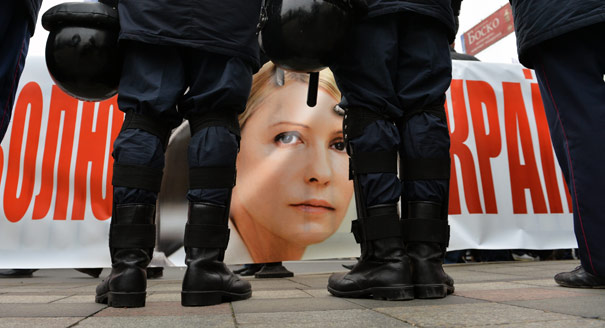This week, two elder statesmen from Ireland and Poland will once again travel to Kiev to attend a session of the Rada, Ukraine’s parliament.
Pat Cox, former president of the European Parliament, and Aleksander Kwaśniewski, former president of Poland, have for the past eighteen months tried to cajole Ukrainian politicians into introducing far-reaching reforms. They believe reforms are both in Ukraine’s and Europe’s interests.
Cox and Kwaśniewski have never pulled punches when dealing with President Viktor Yanukovich or the Ukrainian opposition. They keep reminding their interlocutors about what is at stake when EU leaders meet next week in Vilnius with the Eastern Partnership countries. Apart from Ukraine, these include Armenia, Azerbaijan, Belarus, Georgia, and Moldova.
In Vilnius, the EU is offering a new trade, political, and visa liberalization accord to countries that have implemented a package of reforms. But despite earlier promises, Ukraine’s government is now vacillating over a number of measures.
“Failure [by Ukraine] to sign in Vilnius would mean the postponing of the agreement for an indefinite number of years,” Kwaśniewski told the Ukrainian new agency, UNIAN.
Ukraine’s problem is twofold: to satisfy the EU, the country has not just to pass but also to implement major political and judicial reforms. Whether it has made enough of an effort to do both is debatable, to say the least.
But, to make things even more complicated, the reform issue has become entangled with the fate of Yulia Tymoshenko, a former Ukrainian prime minister who is serving a seven-year prison term for alleged abuse of office. The EU sees her as a victim of political justice and demands her release for medical treatment in Germany as a precondition for signing any new agreement with Ukraine.
Europeans remember Tymoshenko as the heroine of the 2004 Orange Revolution in Ukraine. Her imprisonment in 2011─and the failure of the prison authorities to treat her back problems appropriately─ has put Yanukovich into a tight corner.
Yanukovich considers Tymoshenko a dangerous rival. He and his supporters see her as an overbearing, ruthless politician who has never been willing to find the compromises necessary to bringing Ukraine’s political culture out of its dysfunctionalism. Yet the same could be said of his administration and so many other Ukrainian politicians.
Yanukovich also fears that if his country’s most famous prisoner was granted a pardon to receive medical treatment abroad, she would make a bid to stand for president in 2015.
Against this background of rivalries and short-term interests, the Rada last week failed to agree on legislation to allow Tymoshenko to travel to Germany for treatment. Now, time is getting short. The Vilnius summit takes place on November 28-29.
The Rada will convene again on Tuesday, with Cox and Kwaśniewski present, to debate judicial reforms. The two EU envoys will also deliver their reports to Brussels this week about how far Ukraine has gone in implementing reforms, and if indeed it meets the EU’s conditions for signing the new accord.
Their conclusions have implications for Europe’s long-term strategic interests. Ukraine is a big country that is richly endowed with raw materials and commodities. But its economy, including the energy sector and infrastructure, continue to be paralyzed by politicians and oligarchs unwilling to embrace radical reforms since the Orange Revolution. One can only imagine how investment and modernization would take off if major economic reforms were ever implemented.
There is also the foreign policy, strategic aspect. Ukraine shares borders with Poland and Russia, Belarus and Hungary, Slovakia and Moldova. Just imagine what kind of geopolitical role it could play in the region if its political class could rise above the internecine politics.
Will an agreement over Tymoshenko be found? The EU has a clear interest in anchoring Ukraine to the West, but it will not bend over backwards for Yanukovich. For far too long, the Ukrainian president has played off the EU and Russia against each other.
So, it is up to Ukraine to choose: if it does not move closer to Europe now, its dysfunctional political and economic system is likely to be perpetuated. The political atmosphere in Ukraine will become even more poisonous.
One exasperated EU official told Carnegie Europe that the government and opposition politicians refuse to see the bigger picture.
“The political immaturity and infighting are so frustrating to deal with. This has been going on since 2004. They are all fighting for their own agenda. They don’t see the bigger context,” the official, who requested anonymity, said.
Indeed, Yanukovich and lawmakers will have to make an enormous political leap to break this deadlock before Vilnius.
Hats off if they do. Yet consider what happens if they don’t: it will be Russian President Vladimir Putin who will be raising the champagne glass.



.png)






